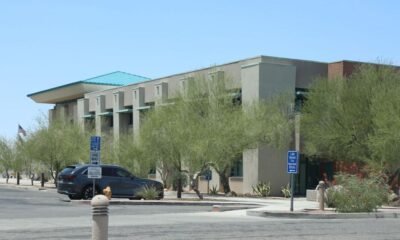Business
Tucson City Employees Set to Receive Xmas Bonuses; TUSD’s Trujillo Scores Own Goals

Tucson’s city employees could receive a one-time bonus of $1,000 this fiscal year, pending a review by the City Council. The bonuses are part of a “mixed bag” of financial updates emerging from the ongoing mid-year budget review, with exact figures still being assessed. City Manager Tim Thomure indicated that if the financial situation remains steady, employees might see these bonuses by Christmas.
Earlier this year, unexpected factors such as a severe state budget deficit complicated Tucson’s budget planning, prompting the deferment of potential salary raises. Employees received a modest 1.5 percent raise on July 1, but the Council refrained from making any substantial commitments until more data was available.
While Tucson’s revenues have exceeded projections for this fiscal year, the city finished the previous fiscal year in a more precarious financial position than expected, meaning the current surplus merely compensates for prior deficits. Moving forward, the city is cautious about incorporating raises into salaries, opting instead for bonuses totaling approximately $4.75 million—$1,000 for full-time workers, $500 for part-time staff, and $250 for non-permanent part-time workers. This approach allows the city to retain financial flexibility for future years.
In addition to bonuses, the city plans to maintain a tuition reimbursement program for employees at a cost of $1.75 million. The circumstances could have been dire, as city leaders had previously prepared for possible layoffs and hiring freezes amid economic uncertainty.
At the same time, Tucson’s economy shows positive signs, with state revenue reports indicating only a 6.5 percent decrease compared to last year, an improvement over earlier estimates of a 10 percent drop.
In a related discussion, Tucson’s water rates may see an increase as council members deliberate a new pricing structure. Over the next three years, rates for commercial customers could rise from $3.43 to $3.91 per hundred cubic feet, with summer surcharges also experiencing an adjustment. Despite the growing rates, Tucson’s water supply remains stable, even amid ongoing drought conditions.
The council will also review an impact fee infrastructure plan to help fund city improvement projects, with the fees intended to alleviate the costs associated with new developments.
Amid these discussions, the Tucson council is also set to evaluate changes to land development regulations, allowing for a slight increase in the conversion of commercial properties into multi-family units. This adjustment aims to facilitate housing development without bureaucratic delays.
Moreover, the council will consider the appointment of Teri Traaen as the new director of the Human Resources Department. Traaen’s experience includes a past role as HR director in Prescott Valley and consulting for public non-profit organizations, poised to take on her new post at an annual salary of $200,000.
In addition, the council plans to vote on renaming a downtown underpass after Donovan Durband, a significant figure in Tucson’s downtown redevelopment efforts who passed away in June 2023.
Tucson Unified School District (TUSD) Superintendent Gabriel Trujillo is preparing to present ambitious performance goals for the school district, despite reporting declines in some metrics. He aims for continuous improvement across various academic benchmarks, though recent data reflects mixed results.
As statewide educational policies shift towards universal vouchers for charter and private schools, enrollment in TUSD has seen a decline, complicating budget adjustments. The district’s official enrollment dropped to 37,004, prompting a reevaluation of financial strategies.
On the other hand, the Sunnyside Unified School District plans to report an increase in available funds, resulting from unexpected state aid and grant allocations, despite a slight enrollment decline.
Lastly, the Vail Unified School District is in the process of rectifying discrepancies related to funds owed by the County Schools Superintendent’s office, with efforts ongoing to establish a clear resolution.
In Sahuarita, the Town Council will vote on new zoning rules, allowing residents to keep a minimum of six birds on single-family lots, following state mandates. As the council operates amid shifting regulations, residents are encouraged to remain informed about ongoing developments that impact the local community.
















